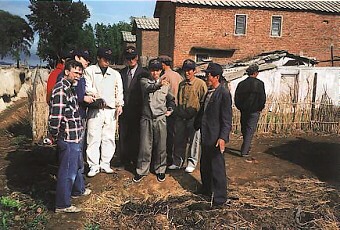Nautilus Institute Completes First American Windpower Village Project in North Korea
BERKELEY, MAY 22 –The US-DPRK Village Wind Power Pilot Project team has completed successfully the construction of the first of seven wind turbine towers in a rural village on the west coast of North Korea. Dr. Peter Hayes, the Executive Director of the Berkeley-based Nautilus Institute, made the announcement today upon return from North Korea via China.
“The American team of three wind power engineers worked in joint teams with their North Korean counterparts for five days to design, erect, and equip the 100 foot tower which had been shipped from the United States,” he said.
“After raising the tower once, we installed two wind measuring devices and the micro-electronic readout systems to record the wind speed over the next four months before we return in September,” he added.
“Upon arrival in this rural village, the tension in the air was palpable. For decades, these people have been taught that Americans are the enemy. Here we were in their vegetable fields raising a tower to generate electricity for their houses, a kindergarten, and a medical clinic. It took everyone a few days to overcome their initial fear and distrust, but after five days of working shoulder-to-shoulder, we left knowing that we have established a foundation of goodwill and trust,” he said.
“One way we overcome this distrust was to give everyone American baseball caps with ‘wind power’ written in Korean and English. The whole construction team and officials from Pyongyang, the county, and the village were all wearing these hats with us,” he said. “They were a real icebreaker.”
“The village to which we are providing wind power grows rice on reclaimed mudflats. Last year, a twenty-five foot tidal wave overwhelmed the dykes and flooded the fields with salt water. The village is still recovering from this blow,” he explained.
“The village’s medical clinic in particular will benefit from this project,” Hayes asserted. “The clinic was very basic. We will install reliable electric power, efficient lightbulbs and a refrigerator for vaccinations, and equipment to cut traditional herbal medicines and to make pills out of them,” he said.
“We will also leave our team’s first aid kit at the clinic, and will send them basic antibiotics with which to treat the village population,” he noted.
“We will return in September to complete the installation. We have six more towers to put up, and seven wind turbines and the balance of the system, including wiring, to the load centers in the village. We are confident that we can realize this goal, even under the extreme conditions of North Korea’s famine,” he concluded.
The private project, funded by the W. Alton Jones Foundation in Virginia, is the first American non-governmental attempt to engage cooperatively with North Korea. Until now, non-governmental organizations have been limited by both the American and the North Korean governments to delivering food aid to North Korea.
“That we were invited to work in North Korea at such a difficult time in the bilateral relationship indicates a willingness by the North Koreans to explore creative solutions to the gridlock in official relations,” Hayes asserted.
“Rural North Korea is highly militarized. To be working cooperatively at all in such a sensitive area was amazing. We were given full access to all the facilities and sites we requested in order to fulfill our operating requirements in this project. This shows that the North Koreans are fully committed to the success of this project,” he stated.
Some difficulties remain, however. One important issue to the American team was site safety and electrical hazard, both on the site, and in designing the system to integrate with the North Korean grid.
“North Korean electricity officials were reluctant to give us copies of the relevant laws relating to safety codes for electricity construction work and to environmental regulations. They argued that these were internal laws, not for external use.”
“We argued that we had to know the legal obligations under which we were liable when working in North Korea. After all, we are dealing with 230 volt electricity which can kill someone in a flash,” Hayes said.
“I am confident that with give-and-take, we can solve this issue over the coming months. But the issue illustrates the enormous cultural and political distance between the two countries,” Hayes said.
The Nautilus Institute wind power team consisted of Dr. Peter Hayes, an Australian expert on Korean security issues and long-time resident in the United States; Dr. Jim Williams, an American expert on renewable energy technologies; Mr. Mick Sagrillo, a leading wind turbine construction engineer; and Mr. Chris Greacen, an expert on rural electrification in developing countries.


